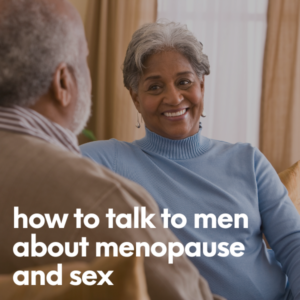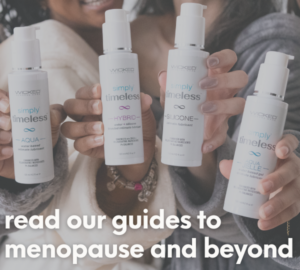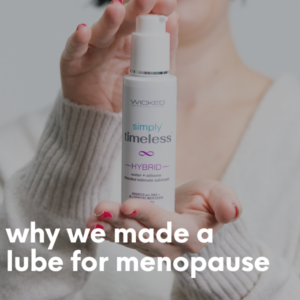How to Talk to Men About Perimenopause, Menopause and Sex
For many men, navigating the changes that menopause brings can feel like unfamiliar territory, especially when it comes to supporting their partner’s needs in the bedroom. But here’s the truth: with the right information and a little empathy, menopause can be a chapter of growth, discovery, and renewed intimacy for both of you. 
In this guide, we’ll explore how menopause affects sexual intimacy, provide practical tips for maintaining connection, and Wicked Sensual Care’s simply® timeless collection—products specifically designed to support comfort and pleasure during this natural stage of life. Let’s turn what might feel like an uncomfortable conversation into one of empowerment and closeness, because intimacy doesn’t end with menopause—it evolves.
What Is Menopause?
Menopause marks the end of a person’s reproductive years, typically occurring between the ages of 45 and 55, though it can happen earlier or later for some. This process is defined as going 12 months without a period and involves a significant drop in estrogen levels, which can affect various aspects of health, including sexual function and desire.
Some of the most common symptoms include:
- Vaginal dryness
- Hot flashes
- Decreased libido
- Mood swings
- Sleep disturbances
These changes are natural but can cause feelings of frustration, confusion, or even sadness for both partners. However, knowing what to expect and how to respond can help make this transition smoother.
 Common Questions About Menopause
Common Questions About Menopause
Before diving into tips on how to communicate and support your partner during menopause, let’s address some of the most common questions men have about this phase.
When Does Perimenopause Start?
Menopause itself is often a gradual process, with symptoms sometimes starting during the years leading up to it, known as perimenopause. Perimenopause can begin as early as 10 years before the onset of menopause. See our guide to Perimenopause and Sex for tips on talking to your partner about this stage of menopause and intimacy.
How Long Can Menopause Last?
This stage can last anywhere from a few months to several years, with menopause symptoms continuing afterward for up to 14 years in some cases.
Can You Have Sex After Menopause?
Absolutely! Many people continue to enjoy satisfying sex lives well after menopause. While hormonal changes can affect libido and comfort during sex, this doesn’t mean intimacy has to end. With the right approach and support, you can maintain a healthy and enjoyable sexual relationship.
How Does Menopause Affect Libido?
Lower estrogen levels during menopause can lead to a decrease in sexual desire for some. However, it’s important to remember that libido is influenced by many factors, including emotional well-being, stress levels, and relationship dynamics. Communicating openly with your partner about their needs can help address this change.
 How to Communicate About Menopause
How to Communicate About Menopause
Talking openly with your partner about menopause is essential for building understanding and compassion. Here are some tips to guide you through these conversations:
1. Approach the Topic with Compassion
Start by acknowledging that menopause is a natural life stage and that the changes it brings are not something your partner can control. By approaching the subject with empathy, you can create a supportive space for your partner to share their feelings and experiences.
2. Be Open to Listening
Listening to your partner without judgment or trying to “fix” the situation is key. Sometimes, your partner may just need to talk about what they’re going through, whether it’s physical discomfort or emotional ups and downs. Simply being there and showing that you care can go a long way.
3. Ask Questions, But Don’t Push
It’s okay to ask questions about what your partner is experiencing, but try not to make them feel like they need to explain or justify their symptoms. Focus on learning how you can be supportive, whether that’s helping with daily tasks or simply offering emotional support.
4. Normalize Conversations About Intimacy
Talking about sex after menopause can feel awkward, but normalizing these conversations is important. Ask your partner how they feel about intimacy, what makes them comfortable, and if there are ways to enhance their experience. Remember, communication is essential for maintaining intimacy, especially as bodies change.
How Menopause Affects Sexual Intimacy
As estrogen levels drop during menopause, many people experience physical changes that can affect their comfort and desire for sex. Understanding these changes will help you empathize with your partner and find solutions together.
Vaginal Dryness and Discomfort
One of the most common symptoms of menopause is vaginal dryness, which can make sex uncomfortable or even painful. This is where personal lubricants designed for menopause, like those in Wicked Sensual Care’s simply® timeless collection, come into play.
 The simply® timeless Collection
The simply® timeless Collection
Wicked Sensual Care’s simply® timeless line includes four products specifically designed to address the needs of individuals experiencing perimenopause, menopause, and beyond. These lubricants provide much-needed moisture, alleviate dryness, and enhance comfort during intimacy. Here’s a breakdown of the products in this collection:
- simply® timeless Aqua: A gentle, water-based lube with hydrating ingredients like aloe and sodium hyaluronate to soothe sensitive skin.
- simply® timeless Aqua Jelle: A thicker water-based lube for those who prefer a little more cushion during sex.
- simply® timeless Hybrid + DHEA: A unique blend of water and silicone with added DHEA, a hormone that can help support vaginal tissue health.
- simply® timeless Silicone: A long-lasting silicone lube that provides a smooth, silky glide for enhanced comfort.
These lubricants are free from parabens, glycerin, and other potentially irritating ingredients, making them perfect for individuals with sensitive skin. They are also safe to use with sex toys and latex condoms.
Decreased Libido
It’s not uncommon for libido to fluctuate during menopause. While some people may experience a decrease in sexual desire, others may not notice much change. If your partner is experiencing a lower libido, there are several ways to rekindle intimacy:
- Focus on Emotional Connection: Strengthening your emotional bond can enhance physical intimacy. Try spending more quality time together, whether that’s through shared activities or simply engaging in more meaningful conversations.
- Explore New Types of Intimacy: Physical intimacy doesn’t have to mean penetrative sex. Cuddling, massaging, or other forms of touch can help maintain closeness without putting pressure on traditional sexual activities.
- Consider Natural Remedies: If your partner is looking to increase libido after menopause naturally, encourage them to explore options like exercise, stress reduction techniques, and a healthy diet. These can all contribute to improved overall well-being and sexual health.
How to Support Your Partner During Menopause
Supporting your partner during menopause is about more than just understanding the physical changes they’re going through—it’s about offering emotional and practical help as well. Here are some tips:
1. Be Patient with Mood Swings
Hormonal changes during menopause can cause mood swings, irritability, and even feelings of depression or anxiety. Instead of reacting negatively, be patient and offer a listening ear. Sometimes, just being there can help your partner feel more grounded and supported.
2. Help Relieve Physical Symptoms
There are plenty of ways to help your partner manage physical symptoms. For example:
- Encourage Hydration: Drinking plenty of water can help combat vaginal dryness and other menopause-related symptoms.
- Support Exercise: Regular physical activity is known to help reduce the severity of symptoms like hot flashes and mood swings. Offer to join your partner for a walk or a yoga session.
- Suggest Trying a Menopause-Specific Lube: simply® timeless lubricants can make sex more comfortable by alleviating dryness and irritation. These products are designed with menopause in mind, ensuring that they’re gentle on sensitive skin while still enhancing intimacy.
3. Make Time for Intimacy
With the added stress of menopause, it can be easy to let intimacy fall by the wayside. However, making time for each other is crucial for maintaining a strong relationship. Whether it’s planning date nights or finding quiet moments to connect, prioritizing your relationship will help you both navigate menopause with greater ease.
 Expert Insights from Senior Sex Educator Joan Price
Expert Insights from Senior Sex Educator Joan Price
Navigating intimacy during and after menopause can be challenging, but Senior Sex Educator and advocate for ageless sexuality, Joan Price, offers some valuable tips for keeping pleasure alive during this life stage. According to Joan, the key is:
- to embrace the changes and adapt in ways that prioritize comfort and pleasure.
- using high-quality lubricants like simply® timeless Aqua or timeless Hybrid + DHEA, which provide long-lasting moisture and are gentle on sensitive tissues.
- don’t be afraid to experiment with different types of touch, incorporate sex toys designed for post-menopausal bodies.
- and—most importantly—keep the lines of communication open with your partner. There’s no expiration date on sexual pleasure, and with a little creativity, you can continue to enjoy intimacy at every stage of life.
The Importance of Educating Men on Menopause
Men often feel left out of the conversation when it comes to menopause, but their understanding and involvement are essential. By educating yourself and communicating openly with your partner, you can help demystify menopause and create a more supportive environment for both of you.
Understanding the changes that happen during menopause can lead to better communication and a stronger emotional connection. Products like Wicked Sensual Care’s simply® timeless line are specifically formulated to ease the discomfort that can come with menopause, ensuring that sex remains enjoyable and fulfilling.
How to Talk to Men About Menopause and Sexual Intimacy
Menopause doesn’t have to mean the end of intimacy. With the right approach, support, and products, you and your partner can navigate this life transition together while maintaining a fulfilling and connected relationship. Open communication, empathy, and solutions like simply® timeless lubricants will ensure that both partners feel heard, respected, and cared for during this time.
For more information on the simply® timeless collection and how to maintain intimacy during menopause, visit Wicked Sensual Care’s Menopause Hub.
Sources:
- Joan Price’s endorsement of simply® timeless: Wicked Sensual Care simply® timeless Menopause Collection
- Understanding Menopause and Intimacy: North American Menopause Society
- Does Sex Help with Menopause?: Mayo Clinic – Menopause
- Supporting Your Partner Through Menopause: Verywell Health: Supporting Your Partner During Menopause
- Wicked Sensual Care simply® timeless Collection FAQs: Wicked Sensual Care – Menopause Lubricants FAQ
Share with your friends:
Subscribe to the Wicked Sensual Community Newsletter!

